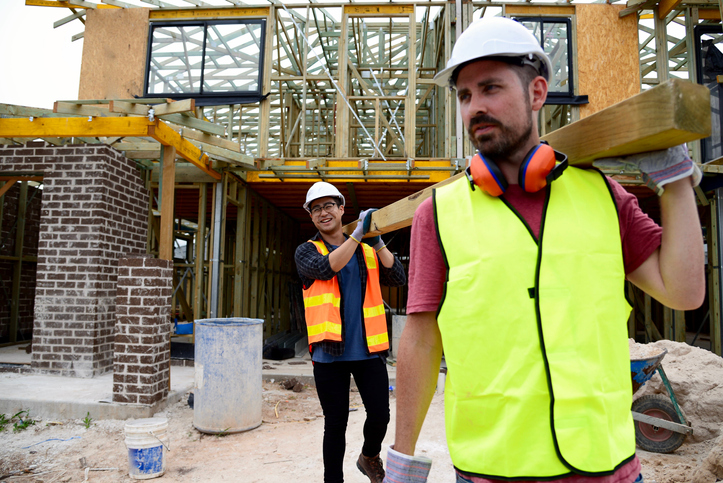How industry professionals can protect themselves, employees, and clients amid COVID-19
In a few short weeks the world as we know it has changed. The coronavirus pandemic has thrown businesses, communities and industries into a state of uncertainty, with unprecedented challenges affecting people around the world.
It’s not only causing disruptions to the way we live and interact with one another, but it’s also changing the way we work on a daily basis. Few industries are unaffected, but while the rules and regulations relating to hospitality and retail are somewhat clear, the construction and trades industry in Australia is a lot more uncertain.

With a seemingly endless stream of evolving policies and intensifying restrictions, it can be difficult for contractors and industry professionals to keep up with the latest updates and understand what is expected of them.
Despite this uncertainty, with many home and building maintenance services considered “essential” for the time being, it’s more important than ever for industry professionals to ensure the safety and wellbeing of themselves and those around them – from contractors, to suppliers, to customers – is their top priority.
Here are a couple of tips to help your business stay up to date with the latest guidelines, and keep everyone connected with it safe and well.
Stay informed and adaptable
Daily updates and rapidly-evolving advice from the government and health organisations means that it can be difficult to filter through the noise and understand what to trust.
However, it’s important to have the most up-to-date information. Staying on top of breaking developments will help you make informed decisions regarding your day-to-day business operations, and will help you plan for the impacts of new safety measures and restrictions.
Your customers, too, will be confused, but demonstrate that you are taking the situation seriously by keeping them updated on how your business and industry is affected and how, when and where they can interact with you, should give them some peace of mind. By keeping on top of the latest updates, you increase your ability to adapt and react quickly.
Communicate with your customers, often and honestly
There remains uncertainty about what the various stages of an Australian lockdown would mean for builders, plumbers, electricians and other tradies.
At the time of writing, tradies are still able to complete many home and building maintenance services, providing both the homeowner and contractor are healthy and adhere closely to existing guidelines such as ensuring they remain at least 1.5 meters apart and work in groups of no more than two. Of course, it’s also possible that contractors and small businesses may have to pause – or scale back – their work at some point due to updated health and safety recommendations.
Whatever happens, it’s vital that you communicate the situation quickly and clearly to your customers, and any subcontractors or staff you have. Similarly, reach out to your suppliers too – if they’re affected and can’t operate as usual, it could impact both you and your customers.
When liaising with customers and staff, sharing information such as why projects have to be delayed, updated project timelines and what customers can expect moving forward, is an important way to keep them updated.
Likewise, if you’re still allowed to operate, keep your customers informed of the steps you’re taking to ensure their health remains paramount and any potential disruption to projects.
Make health and safety your number one priority
It’s important to put measures in place to ensure that no potential signs of coronavirus are allowed on or near a job site, client or other workers. If you, or anyone on your team, are displaying any symptoms of the virus, there is a potential transmission risk. If you or they are worried, don’t take the risk – self-isolate until you’re better or have been advised by a health professional that you pose no risk to others.
Be one step ahead by implementing preventative measures to help limit the spread of the virus. Viruses can linger on many surfaces for hours, so regularly wipe down mobile phones, workstations, handles, doorknobs, and tools with a disinfectant. Follow the health organisation’s advice and ensure you and any employees or other visitors to the job site wash their hands with soap and water for at least 20 seconds, at least three to four times throughout the day. If possible, apply hand sanitiser in addition to regular handwashing.
If you employ other workers or subcontractors, consider reviewing your sick-leave policies and ensure they are flexible enough to accommodate the current environment and the increased strain placed on your team. Consider waiving any requirements for certificates from healthcare professionals to validate illness or to return to work. GPs and medical facilities are extremely busy at this time, and those requests are likely not their priority. What’s more, with everyone a little scared and distracted, your employees will likely value a little leniency and flexibility where possible.
Be vigilant and follow the rules
Many Australian businesses have shut their doors, with staff temporarily working from home and current restrictions set to last for 90 days in certain states. Vacant office spaces and businesses could mean there are opportunities to take on more projects in a way that keeps you, your family and the general public safe, while still being able to earn an income.
If you’re still working on jobs that involve contact with other people, ensure you follow the latest health guidelines.
Another way to practice social distancing during this time is to work towards digitising more business processes. Consider upgrading the resources you use to conduct business, such as making the switch to mobile invoicing with tools like, for example, Invoice2go.
This not only reduces the amount of person-to-person contact, but it automates portions of the business that would have been previously conducted manually. With every project, invoice and payment more important than ever before, take the pressure off yourself by implementing software and other processes designed specifically to help you take control of your finances and your time.
Preparing for a return to normality
If, in the short-term, you do find yourself with less work than you would usually expect, consider using the time to complete tasks you’re normally too busy to do. Think, for example, of those receipts and invoices you’ve been meaning to digitise, the former clients you wanted to reconnect with, or the additional certification you wanted to take on. They might not be immediate revenue-generating tasks, but they’re tasks that will likely improve the fluidity and behind-the-scenes foundations of your business and ensure that, when things begin to open back up, you and your business are ready to hit the ground running.
Whether you’re a builder, plumber, electrician or something else entirely, you might be feeling the pinch right now, it’s important to remember that you’re not alone. In a time of uncertainty, look to the things you can control. By being vigilant, staying informed and communicating honestly and regularly with everyone involved in your business, you can ensure that not only can your employees and clients remain safe and healthy, but your business is better prepared for whatever the coming months throws at it.

Greg Waldorf is the CEO of invoicing and estimate app Invoice2go. Greg has a long history of involvement with leading technology businesses and his current team is revolutionising how the world’s smallest businesses work.
